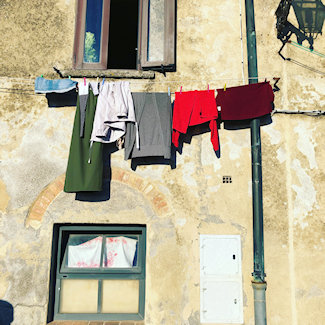“Oh, hi,” I said, holding my newborn son for the first time. I took in his translucent skin, red fuzz, bright baby blues, and…didn’t recognize him. “Who are you?”
It hadn’t been like that with my daughter. She’d had the look of my husband at birth so completely that I could only laugh at her tiny button nose and wide lips. But my son resembled me in a way that felt both familiar and strange from the moment I laid eyes on him. Because half of me is a question mark.
This is the legacy of absent fathers, I thought as I kissed my infant’s fingers and toes.
“Maybe this is fate’s way of healing you,” my sister suggested.
*
Growing up, my sister and I shone like changelings next to the coffee-colored eyes and dark hair of our mother’s swarthy Black Irish kin. We wove through their midst like twinkle lights accidentally strung up in a strand of sturdy icicles.
We might have recognized ourselves better among our father’s family, with their round Scandinavian cheekbones and golden hair fine as spider silk. We didn’t have that chance though. My father—known widely as Dude—had been present at my birth, but he wasn’t there for the rest of it: learning to read or ride a bike, shopping for bras.
I sometimes imagine Dude pressing a palm to my mother’s back as she labored with me in their tiny trailer in Anchorage, Alaska, visualizing the life we’d share. She with her cello, playing barefoot in the small thatch of yard beyond. Me on his lap, soaking in his garlicky man-smell and booming operatic voice.
It might have gone that way, too, if not for the raid on our trailer.
Dude was a small-time pot dealer in an era when it carried big-time consequences. The raid brought a revelation: he hadn’t stopped dealing after we girls were born, as promised, had ramped up business instead. The cops at our door drew a worried circle at my mother’s feet. What if she lost us kids to the state? A few months later she took us to visit her family in Petersburg, Alaska. Our tickets were one way. Over the years Dude tracked us down, town by town, each surprise visit leading to another panicked midnight move.
*
When I met my father again as a teenager it came with a shock of recognition and confusion. He looked like me—there was my bumpy nose, red hair, round cheekbones, the yellow-flecked blue eyes—but our likeness wasn’t enough to overcome the strangeness of him. He reminded me of a very stoned and deeply strange Paul Bunyan. And he was so tall; a mountain compared to the foothills I’d grown up among.
“I didn’t think he was real,” I whispered to my sister in the car afterward.
She shook her head. “Me either.”
*
Twenty-five years later I gave birth to his reincarnation.
My son is now a little older than I was when we left Dude and resembles him more by the hour. I often hold him as he sleeps, awed by the hopeful thump of his heart, those slender ribs against my arm.
Had Dude ached to know me the way I’d yearned to connect with him growing up? I’ll never know. He died before motherhood opened the secret compartment of unasked questions I’d set aside for later. And because of that, it would be easy to lean into divine intervention, as my sister suggested, when my boy smiles lovingly up at me out of my father’s cornflower blue eyes.
“I love the mystery of you,” I say, instead, to my young son.
___
Keema Waterfield is the author of Inside Passage, a nomadic childhood memoir set along the wild coast of Southeast Alaska. Her work has appeared in The New York Times, WIRED, Brevity, and others. She resides in Missoula, Montana, with her husband, two children, a bunch of extra instruments she doesn’t know how to play, and a revolving cast of quirky animals. She lives and writes on Séliš and Qlispé land. Find her at www.keemawaterfield.com or follow her on Twitter and Instagram @keemasaurusrex.
Photo by Dinty W. Moore


5 comments
Jan Priddy says:
Jan 21, 2022
This is a powerful piece that immediately connects, in my mind, to Tobias Woolf’s abrupt and furious realization of what his father had abandoned on first holding his own first child and to my mother’s lifelong failure to recognize how hard her father tried to maintain a relationship after her parents’ divorce.
What we cannot know. What we do not know. What we resist knowing.
And Dinty Moore’s photos throughout this issue are a beautiful text of their own.
Ryan Schlosser says:
Jan 27, 2022
Keema, I am currently on the journey of trying to develop a deeper connection with the idea that my father has always been to me. He died when I was two. While our circumstances are different, this piece of yours helps me feel less alone with my longing.
Sean Farley says:
Feb 12, 2022
This piece is beautiful. And it hits home. My father left my family when I was 8 years old. I never saw him again, a fact I carry happily. Who knows what his brutish, racist, homophobic influence might have had on my willowy, diverse, homosexual self. I’m better off never having known him beyond those 8 hazy years. But this piece resonates because the author is as transfixed on the absence as I am. I think she, too, is just as better off not having known her father beyond those silvers of visits.
Vanessa says:
Mar 1, 2022
BEAUTIFUL!
Mary Kaczowka says:
Mar 27, 2022
This was fantastic! I loved it.